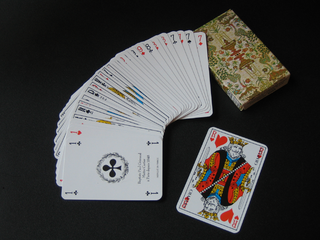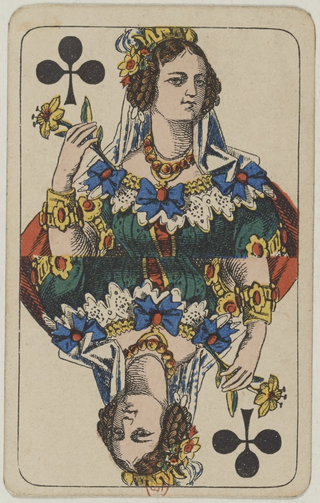Related Research Articles

A card game is any game that uses playing cards as the primary device with which the game is played, whether the cards are of a traditional design or specifically created for the game (proprietary). Countless card games exist, including families of related games. A small number of card games played with traditional decks have formally standardized rules with international tournaments being held, but most are folk games whose rules may vary by region, culture, location or from circle to circle.

Oh hell or contract whist is a trick-taking card game of British origin in which the object is to take exactly the number of tricks bid. It was first described by B. C. Westall around 1930 and originally called oh! well. It was said to have been introduced into America via the New York clubs in 1931. Phillips and Westall describe it as "one of the best round games".
A stripped deck or short deck (US), short pack or shortened pack (UK), is a set of playing cards reduced in size from a full pack or deck by the removal of a certain card or cards. The removed cards are usually pip cards, but can also be court cards or Tarot cards. Many card games use stripped decks, and stripped decks for popular games are commercially available.

A trick-taking game is a card- or tile-based game in which play of a hand centers on a series of finite rounds or units of play, called tricks, which are each evaluated to determine a winner or taker of that trick. The object of such games then may be closely tied to the number of tricks taken, as in plain-trick games such as contract bridge, whist, and spades, or to the value of the cards contained in taken tricks, as in point-trick games such as pinochle, the tarot family, briscola, and most evasion games like hearts.

Skat, historically Scat, is a three-player trick-taking card game of the ace–ten family, devised around 1810 in Altenburg in the Duchy of Saxe-Gotha-Altenburg. It is the national game of Germany and, along with Doppelkopf, it is the most popular card game in Germany and Silesia and one of the most popular in the rest of Poland. A variant of 19th-century Skat was once popular in the US. John McLeod considers it one of the best and most interesting card games for three players, and Kelbet described it as "the king of German card games." The German Skat Association assess that it is played by around 25 million Germans – more than play football.

In playing cards, a suit is one of the categories into which the cards of a deck are divided. Most often, each card bears one of several pips (symbols) showing to which suit it belongs; the suit may alternatively or additionally be indicated by the color printed on the card. The rank for each card is determined by the number of pips on it, except on face cards. Ranking indicates which cards within a suit are better, higher or more valuable than others, whereas there is no order between the suits unless defined in the rules of a specific card game. In most decks, there is exactly one card of any given rank in any given suit. A deck may include special cards that belong to no suit, often called jokers.

Clubs is one of the four playing card suits in the standard French-suited playing cards. The symbol was derived from that of the suit of Acorns in a German deck when French suits were invented in around 1480.
David Parlett is a games scholar, historian, and translator from South London, who has studied both card games and board games. He is the president of the British Skat Association.

Spades is one of the four playing card suits in the standard French-suited playing cards. It has the same shape as the leaf symbol in German-suited playing cards but its appearance is more akin to that of an upside down black heart with a stalk at its base. It symbolises the pike or halberd, two medieval weapons, but is actually an adaptation of the German suit symbol of Leaves created when French suits were invented around 1480.

Jack–nine card games, also known as the Jass group from the German term for the jack, form a family of trick-taking games in which the jack and nine of the trump suit are the highest-ranking trumps, and the tens and aces of all suits are the next most valuable cards. Games in this family are typically played by 2 or 4 players with 32 French-suited cards.

The following is a glossary of terms used in card games. Besides the terms listed here, there are thousands of common and uncommon slang terms. Terms in this glossary should not be game-specific, but apply to a wide range of card games played with non-proprietary packs. It should not include terms solely related to casino or banking games. For glossaries that relate primarily to one game or family of similar games, see Game-specific glossaries.

A Piquet pack or, less commonly, a Piquet deck, is a pack of 32 French suited cards that is used for a wide range of card games. The name derives from the game of Piquet which was commonly played in Britain and Europe until the 20th century and is still occasionally played by connoisseurs. In the Netherlands it is referred to as a Jass pack, a term derived from games of the Jass type.

German solo or just solo is a German 8-card plain-trick game for 4 individual players using a 32-card, German- or French-suited skat pack. It is essentially a simplification of quadrille, itself a 4-player adaptation of ombre. As in quadrille, players bid for the privilege of declaring trumps and deciding whether to play alone or with a partner. Along with ombre, Tarock and Schafkopf, German solo influenced the development of skat. Parlett calls it a "neat little descendant of Quadrille" and "a pleasant introduction" to the ombre family of games.

Bauerntarock also called Brixentaler Bauerntarock or Brixental Tarock, is a point-trick card game played in the Brixental, Austria. It may have originated in the 19th century either as an adaptation of 54-card Tapp Tarock onto the cheaper and smaller 36-card German pack. Another possibility is that it was adapted from the 78-card Grosstarock or Taroc l'Hombre game as the ratio of trumps to non-trumps is almost the same. It uses the Skat Schedule found in popular regional games such as Jass and Schafkopf. It is closely related to Bavarian Tarock, German Tarok, Württemberg Tarock and especially Dobbm. Like Bavarian Tarock and Tapp, Brixental Bauerntarock and Dobbm do not belong to the true tarot games, but have adopted rules from Tapp Tarock. The most fundamental difference between these games and true tarot games is in the use of German or French decks instead of true Tarot playing cards.

German Rummy or Rommé is the most popular form of the worldwide game, Rummy, played in Austria and Germany. It is a game for 2 to 6 players and is played with two packs of French playing cards, each comprising 52 cards and 3 jokers. There are no partnerships. In Germany, the Germany Rummy Association is the umbrella organisation for local rummy clubs and organises national competitions. The game is often just known as Rommé in Germany and Rummy in Austria.

An ace–ten game is a type of card game, highly popular in Europe, in which the aces and tens are of particularly high value.

Scharwenzel, formerly also called Schipper-Schrill, is a traditional north German plain-trick card game of the Schafkopf family that is played by two teams with two to four players on each team. The game is at least three centuries old and is played today only on the island of Fehmarn in the German state of Schleswig-Holstein. It may be a regional variant of German Solo with which it bears some similarities and it may also have been ancestral to Schafkopf. It is not related to a different game called Scharwenzel or Scherwenzel that was once played in Bavaria.
Jucker, also known as Juckerspiel or Juckern, is a card game that was popular in the Alsace and Palatinate regions on either side of the modern Franco-German border. It is believed to be the ancestor of Euchre and may have given its name to the playing card known as the Joker.
John McLeod is a British mathematician, author, historian and card game researcher who is particularly well known for his work on tarot games as well as his reference website pagat.com which contains the rules for over 500 card games worldwide. He is described as a "prominent member" of the International Playing Card Society and is Secretary of the British Skat Association.

Sjavs is a Danish card game of the Schafkopf family that is played in two main variants. In Denmark, it is a 3-player game, played with a shortened pack of 20 cards; in the Faroe Islands, where it is very popular, it is a four-hand, partnership game using a standard piquet pack of 32 cards.
References
- 1 2 SKAT: Germany's national card game at parlettgames.uk. Retrieved 30 March 2021.
- 1 2 3 The British Skat Association at weddslist.com. Retrieved 30 March 2021.
- ↑ Skat at pagat.com. Retrieved 30 March 2021.
- ↑ Keller, Thomas and Sebastian Kupferschmid, "Automatic Bidding for the Game of Skat" in KI 2008: Advances in Artificial Intelligence: 31st Annual German Conference on AI, Kaiserslautern: Springer, 2008, p. 96. ISBN 978-3-540-85844-7.
- ↑ Skat: König des deutschen Kartenspiels at kelbet.de. Retrieved 23 Feb 2019.